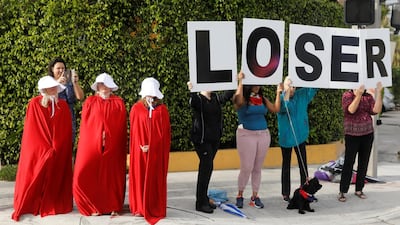The upcoming first anniversary of Donald Trump taking office has been marked by much agonising over the state of democracy in the world: what damage the president may have done to its standing in America in particular, and the rise of strong minded leaders elsewhere, with the by now predictable list of Hungary's Viktor Orban, Poland's Law and Justice government, Turkey's president Recep Tayyip Erdogan and Rodrigo Duterte of the Philippines being regularly mentioned.
Books have been published on the subject, among them Democracy and Its Crisis by the prominent British philosopher AC Grayling, and How Democracies Die by the Harvard professors Steven Levitsky and Daniel Ziblatt. The latter two have taken special aim at Mr Trump, with a recent essay in The New Republic titled "How a democracy dies" - it's pretty clear which one they're worried about - and a joint interview in The Atlantic in which Mr Ziblatt describes Mr Trump as "a president who is demonstrably not fully committed to constitutional and democratic rules of the game".
To which my response would be: calm down. Liberal democracy may be in trouble, but democracy is just fine. As the Wall Street Journal editorial board put it at the beginning of the year: "We're pleased to announce that there hasn't been a fascist coup in Washington. This must be terribly disappointing to the progressive elites who a year ago predicted an authoritarian America because Mr Trump posed a unique threat to democratic norms. But it looks like the US will have to settle for James Madison's boring checks and balances."
Mr Trump clearly poses a unique threat to certain people's blood pressure, but otherwise I'd agree and they may not be James Madison's, but I would argue that the checks and balances are working fine most elsewhere too.
The key question is this: have any of these leaders broken the law? If not, and if they have been democratically elected, then we should defer to the judgement of the peoples who have freely and fairly voted them into office.
_______________________
Read more from Opinion
Gavin Esler Why do politicians lie? When honesty is not always the best policy
Afshin Molavi: One of the defining features of our century will be the rise of the Asian city
Rana Askoul: The road to workplace gender equality is long
_______________________
Critics will say that in many cases governments have circumvented or changed the checks and balances. The same test applies. Were these moves carried out according to the law? If the answer is yes, then there is nothing anti-democratic or anti-constitutional about them. To argue otherwise is to say that constitutions should be set in stone, which would mean that none of the US's constitutional amendments should have been passed, an absurd position to take.
It is also to ignore the fact that democracy is not monolithic or immutable. It changes over time, and takes different forms in different countries and different eras, and must be responsive to and appropriate for the relevant local cultures and values. This ought to be obvious. For much as we laud Athenian democracy, for instance, no one would call for the return of a model under which slaves could not vote, and being ejected from office often meant exile at best and death if you were not so lucky.
Others warn darkly of the dangers of majoritarianism, under which the protections of minorities and dissenters are held to be intolerably eroded. But democracy is inherently, profoundly majoritarian. Indeed, if checks and balances frustrate the repeatedly stated will of the people as expressed at the ballot box, I would argue that they would be undermining democracy itself. Any such permanent obstructions would need to be done away with.
To be clear, a leader who acts illegally, as President Nicolas Maduro has done in Venezuela, is a danger to democracy. There may also be good reasons to fault Hungary's Mr Orba, for instance. Indeed, I could make a long list of his policies I disagree with, but while the people continue freely to return him to power in elections, the democratic nature of their mandates cannot be disputed.
_______________________
Read more from Opinion
Adnan Amin: The falling cost of renewables brings new economic opportunity to the Gulf
Saeed Mohammed Al Tayer: It will require concerted effort to achieve a sustainable future
Sheikh Zayed's environmental legacy lives on in Abu Dhabi energy awards
_______________________
All of which brings us back (as so many conversations seem to nowadays) to Mr Trump. Is he outlandish? Is he outrageous? Yes – but we knew that all along. Has he been, or will he be charged with, breaking any law? He has not, and I would predict that he will not.
It is certainly true that his qualifications for the presidency were, shall we say, unique. But to say that his continued occupation of the Oval Office means that American democracy is under threat is nonsensical. He is there because of a democratic election whose legitimacy – unless hard evidence of Russian collusion is found – is unquestionable.
Real democrats, I suggest, would have more confidence in the system.
The truth, I suspect, is that we are hearing yet more wailing from fake democrats who only support the results they like - and cry foul when the "wrong" people are elected. They forget that in a free and fair democratic election, the "wrong" person can never be elected.
Were the people wise in their choice, did they make a mistake? Posterity can judge, but the people can go one better: they can chuck bad leaders out. Until that process goes wrong, and until the people are denied their proper rights at the ballot box, put the hankies away. Democracy is doing just fine, thanks – and there’s no immediate sign of that changing.
Sholto Byrnes is a senior fellow at the Institute of Strategic and International Studies Malaysia


